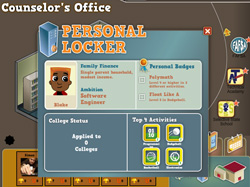 By Nathan Maton
By Nathan Maton
Games and Facebook: We know those are two sure-fire ways of getting kids' attention. Combine them, and you might have a tool to motivate low-income high-schoolers to apply to college.
That's the premise, anyway, for launching Mission Admission -- to help students who don't know what steps to take to get in the college application game.
“These kids didn’t know what kinds of classes they should be spending their time on or basic vocabulary like what is a letter of recommendation," said Tracy Fullerton, a USC professor and the lead game designer on the Mission Admission project about students she worked with, during a seminar at the recent SXSW conference. "They didn't know how to break down the steps into things they could accomplish. They didn't know whether the Frisbee club or physics club would look better on an application."
The process of applying for college is already a game, Fullerton says. "It's just usually played once at such high stakes. If students could play it in a fun and snarky environment, they could learn about the strategies of time management and how to focus their efforts in school."
In Mission Admission, you play a different student every week applying for the same school. You can "upgrade" your school to give it a better reputation, and sort what classes and extra curricular activities to take.

